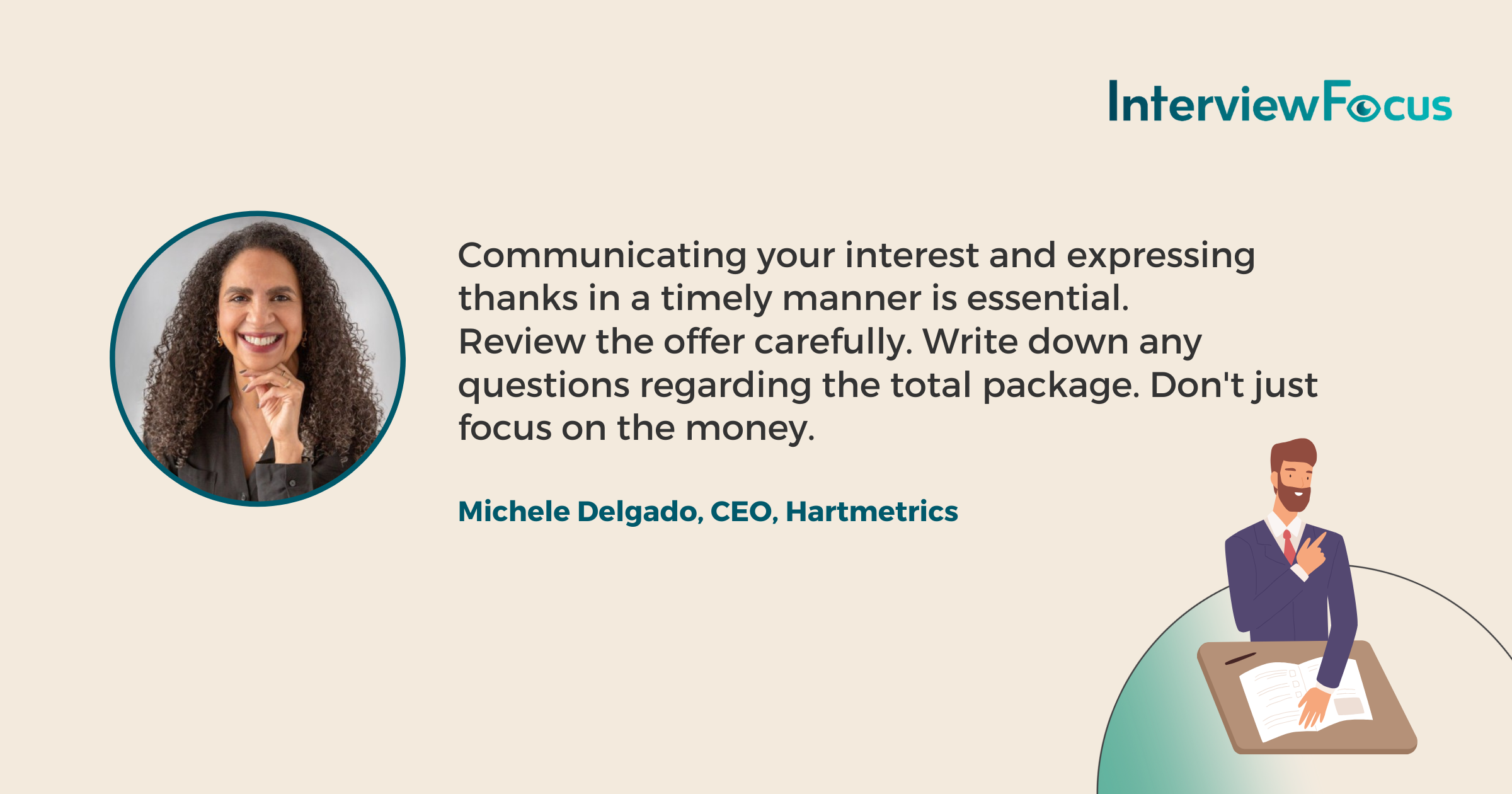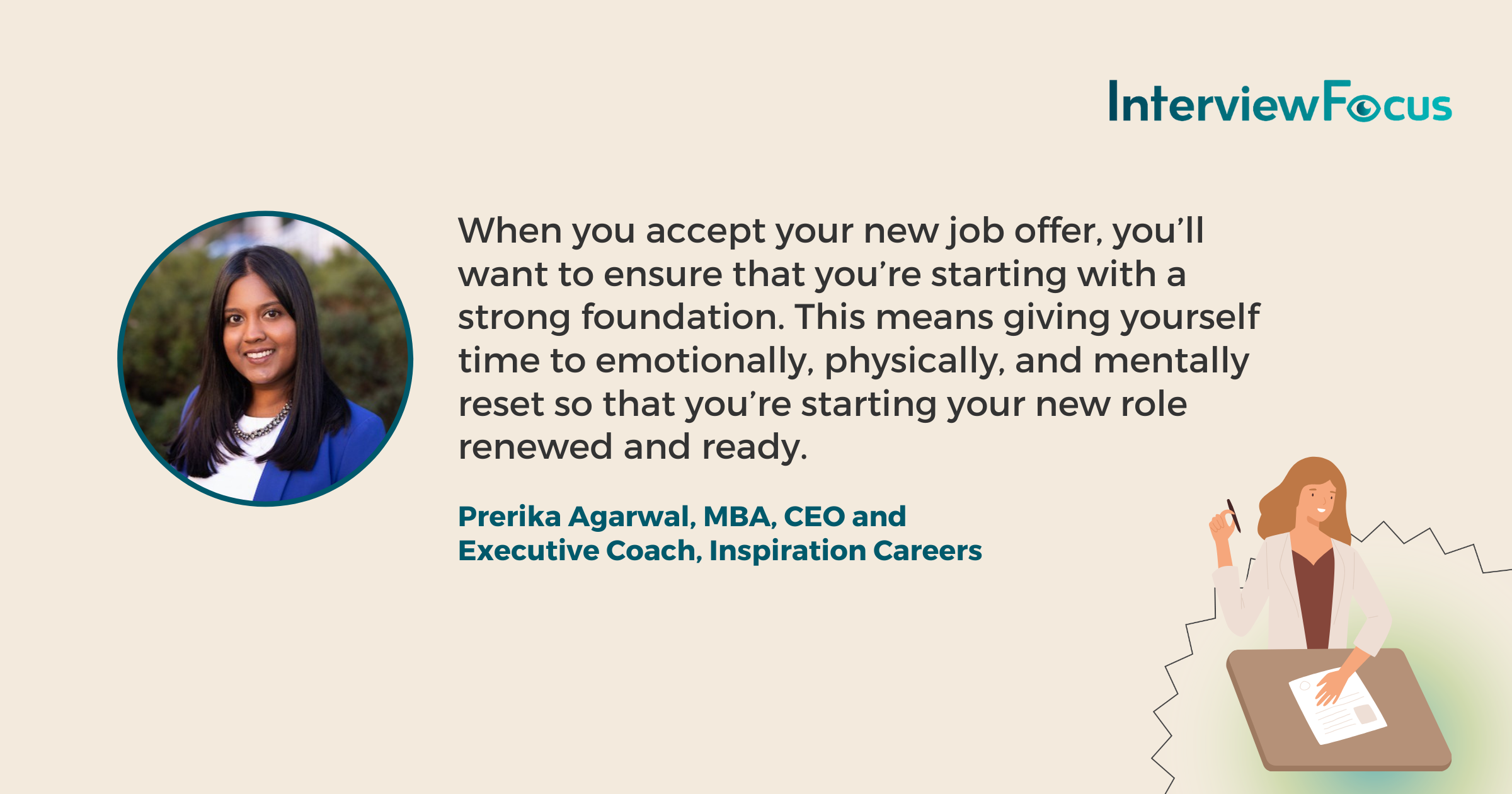What is one best practice for accepting a job offer?
From responding quickly with a thank you for the offer to beginning your new role with a strong foundation, here are the 14 answers to the question, “How do you properly accept a job offer?”
- Respond Quickly With a Thank You for the Offer
- Read Your Contract Thoroughly
- Perform a Reverse Reference Check on the Employer
- Ask for More Time to Respond
- Ask for the Offer in Writing
- Reiterate Your Understanding of the Job Offer
- Understand There Is No One-Size-Fits-All Offer
- Identify Core Non-Negotiables
- Negotiate for Salary and Benefits With Offer in-Hand
- Confirm Pre-Employment Screening Requirements
- Develop a Transition Plan With Your Current Company
- Begin Your New Role With a Strong Foundation
- Share the New Job on Social Media (With the Offer In-Hand)
- Express Your Excitement With Your New Boss
Respond Quickly With a Thank You for the Offer
Communicating your interest and expressing thanks in a timely manner is essential.
Review the offer carefully. Write down any questions regarding the total package. Don’t just focus on the money.
Remember that companies expect you to negotiate, even if it’s minor. Think carefully about what this offer means to you and your goals. From there, you have two options: you either request a follow-up call to negotiate or express your terms via email. Be clear, and always remember to be gracious.
Michele Delgado, CEO, Hartmetrics

Read Your Contract Thoroughly
When you receive your written contract, it’s important to read through it thoroughly to ensure that everything that was agreed upon during negotiation is reflected. Sometimes, it’s possible that HR or the recruiter may have verbally agreed to an extra perk or benefit, but forgot to amend the contract to include this. Or, maybe they were just lying to trick you into accepting a job offer without intending to follow through with what was promised.
To avoid running into this problem, it’s important to have a list on hand of everything that was discussed, and then go through the contract to verify that what you asked for is included before you sign. You want to avoid a situation where, six months down the line, the organization won’t honor a price or benefit they had initially promised all because it wasn’t included in the fine print.
Ann Ayinde, CCS, Career Coach, Western University
Perform a Reverse Reference Check on the Employer
Consider validating your must-haves in a new role before accepting an offer by speaking with current and former staff members at that company. You’re checking to ensure that what they sold you during the interview process matches the reality of working there. This first requires having identified a list of ideal criteria to have in your next role (such as actually allowing all PTO, the type of decision-making power you’re seeking, or even how long your lunch breaks are—all of which will vary by individual).
It’s crucial to validate your criteria during the interview process. But remember, an interview process is still ultimately a “sales” pitch in which a company is recruiting you—even though it may not feel like that at times! Ultimately, before accepting an offer, be sure to perform this “reverse reference check” with those outside of the recruiting process (peers, coworkers, past staff, network connections, etc.) so you know that your criteria matches what’s done in practice.
Nikki Ryberg, MHRLR, CPRW, GCDF, Career Coach, Ryberg Group, LLC
Ask for More Time to Respond
Accepting a job offer is always going to be an emotional task, so make sure to take a step back before giving an answer. It takes the average person 20-60 minutes to return to their physiological baseline after a stressful (or exciting) event, which means you may not be thinking as clearly as you’d like to be the moment a job offer is first presented.
Rarely will a company be upset with you for responding to an offer by saying something like, “Wow, I am so grateful for this opportunity and I don’t take this decision lightly. Would it be ok if I took X days after you send me the written offer to talk to my ____ (spouse, mentors, etc.) before I give you an answer?” Typically, the company is going to appreciate your thoughtfulness and grant your request. But don’t be alarmed if they counter for a day or two less than the number of days you requested in case you decline and they need to extend an offer to someone else. Then, you just take the time to decide if you want to accept or counter with a clear and level-head.
Lauren Daly, Career Coach, devCodeCamp
Ask for the Offer in Writing
You just got off the phone with the hiring manager—the job is a dream and the offer feels real. However, it isn’t confirmed until everything is presented to you in writing. Make sure that you secure formal, written confirmation of the offer, including salary, benefits, bonus structure, starting dates, and any other components of the offer for which you’ve negotiated. If there are multiple rounds of verbal negotiations, confirm all of those details in writing as well. Only once you have the final letter in hand should you tender your resignation at your current company and begin making plans for your future.
Amy L. Adler, President, Five Strengths Career Transition Experts
Reiterate Your Understanding of the Job Offer
Sometimes there isn’t clear communication about the specifics of a job offer. In your written acceptance, reiterate your understanding of the job details, including your new title, salary, and start date. You can make this feel personal and conversational by relaying your understanding of the job role, mentioning your excitement to start, or what you hope to contribute to the team by going through the role’s responsibilities. It’s important that you and your new employer are on the same page from day one.
Gail Kelso, Consultant, Privageo
Understand There Is No One-Size-Fits-All Offer
When you receive a job offer, you’re understandably excited, but if the components of the job offer don’t meet your expectations, then you can choose to reject the offer or negotiate for what you want. It’s vital that you fully understand what the offer fully contains and balance that with what’s important to you.
For some, the ease of commute is crucial. For others, it’s the compensation package. For others even still, they want the option to work from home or a flexible insurance plan. What a single individual would like benefits-wise will vary from working parents, who may place more value on flexible working hours. So, before you accept any offer, take your time to understand the full scope of the job offer, and then accept or decline.
Mher Mardoyan, Career Coach , Mher Mardoyan-Career Coach
Identify Core Non-Negotiables
Though it’s easy to get swept away by the excitement of a new job offer, make sure to proceed with clear-set intentions. When you start your search, you should identify a few core non-negotiables. These can be whatever you need within or outside of the job to make it satisfying for you long-term. Check this list as you prepare to negotiate. You want to present it along the lines of:
Need for non-negotiable + How it can help them/you + A potential solution to start with
An easy way to use this during the negotiation step would be to say something along the following lines: “I put great value on learning career skills that can help me long-term in this industry. Is there any ability to guarantee professional development funds on an annual basis?” Always advocate for yourself, especially if you already have the offer!
Ashley Rizzotto, Senior Job Success Specialist, Merit America
Negotiate for Salary and Benefits With Offer in-Hand
If you receive a job offer, know that you don’t have to give an instantaneous response. It’s perfectly reasonable to ask for some time to review and analyze all aspects of the compensation package. When you do respond, be prepared to negotiate after you’ve done your research on the salary bands of the position title in your locale. Reach an agreement on your salary before negotiating other benefits. Ensure you have practiced what you want to say so you cover all points to sound positive and confident.
Lynne Williams, Resumes & LinkedIn | Executive Director, Great Careers Groups
Confirm Pre-Employment Screening Requirements
In some cases, a job offer and confirmation of your actual start date may be contingent upon other conditions set forth by the employer. Such pre-employment screening ensures each candidate is truly qualified for the position and protects the employer from potential liability concerns. Make sure you’re clear on what’s included in the pre-employment screening.
For instance, are you required to pass a criminal background check? Do you need to pass a pre-employment physical and/or drug screen? Will the employer check your driving record? Does the employer need to verify your education and degree? Will they be verifying your professional credentials? Ask to have the pre-employment screening requirements included in your offer letter so there’s no chance of a misunderstanding.
Shelley Maley, Founder and CEO, Dreamcatcher Career Coaching, LLC
Develop a Transition Plan With Your Current Company
If you need to transition out of your current role, it’s important to 1) create a concrete plan to document workflow, 2) identify point(s) of contact for your successor, and 3) provide pro-tips/lessons learned to set the company up for success after your departure.
It’s helpful to partner with stakeholders to make them aware of your exit so you can work together to develop the transition plan and hand off. I recommend collaborating with your manager to ensure internal colleagues and external individuals (if applicable) are aware of the interim person to contact for certain projects. It’s always best to exit an organization professionally, as it’s a small world and you never know when you will come across prior coworkers in the future!
Megan Dias, Career Services Coach, Parsity
Begin Your New Role With a Strong Foundation
First of all, if you’ve received a job offer, congratulate yourself! It’s important to celebrate your accomplishment. When you accept your new job offer, you’ll want to ensure that you’re starting with a strong foundation. This means giving yourself time to emotionally, physically, and mentally reset so that you’re starting your new role renewed and ready. Instead of rushing into the excitement of starting your new job, give yourself permission to do some of the following:
- Reflect on your past company and role and lessons learned,
- Allow yourself to grieve the loss of the job and time that will no longer be spent with coworkers,
- Take time to process any job-related trauma that may have happened and forgive those involved,
- Finish taking care of any projects that you haven’t been able to get to, and
- Schedule some vacation or time off for yourself in between roles.
All of these things will ensure that you feel rejuvenated and ready to tackle the challenges of the next role.
Prerika Agarwal, MBA, CEO and Executive Coach, Inspiration Careers

Share the New Job on Social Media (With the Offer In-Hand)
Job hunting is a tough slog, and when you have an offer in hand, it’s tempting to shout the good news all over social media and LinkedIn. But wait until you’ve clarified the terms of the new job (compensation, benefits, scope of role) and formally accepted the job in writing before sharing the news publicly. Better yet, wait until you’ve spent a few weeks in the new role before updating your LinkedIn profile and blasting out the news to your network. While it doesn’t happen often, people can land in companies and roles that are a misfit and decide to part ways shortly after starting. Make sure the new job is a keeper before you make it LinkedIn Official.
Katie Fogarty, CEO, The Reboot Group
Express Your Excitement With Your New Boss
If the recruiter extends the offer and you accept it, make sure to thank them for the opportunity and share your excitement. This is a great time to impress your new boss, so follow up in writing with them and express your enthusiasm for the role and company. Ask if there is anything you can do to prepare for your first day so you can hit the ground running.
Peggy Hogan, SHRM-SCP, CPCC, VP of Talent Services, Purple Ink LLC






